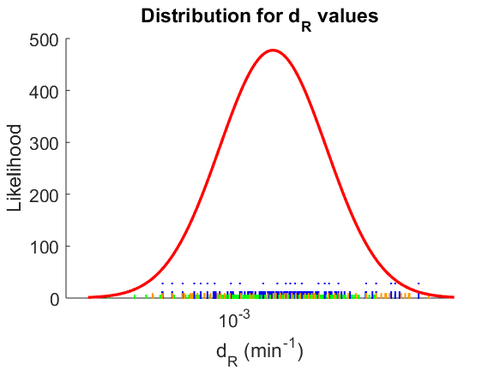Difference between revisions of "Degradation of R2"
| Line 1: | Line 1: | ||
The ScbR homo-dimer (R<sub>2</sub>) degrades. | The ScbR homo-dimer (R<sub>2</sub>) degrades. | ||
<imagemap> | <imagemap> | ||
| − | Image: | + | Image:Back button.png|150px|right|alt=Go back to overview |
default [[Welcome to the In-Silico Model of γ-butyrolactone regulation in Streptomyces coelicolor|Go back to overview]] | default [[Welcome to the In-Silico Model of γ-butyrolactone regulation in Streptomyces coelicolor|Go back to overview]] | ||
</imagemap> | </imagemap> | ||
Revision as of 22:41, 28 September 2015
The ScbR homo-dimer (R2) degrades.
Contents
Chemical equation

Rate equation
![r= d_{R}\cdot[R_{2}]](/wiki/images/math/5/d/f/5df0e6c4bd7b2a7e0b8b3c857b08556b.png)
Parameters
The parameter of this reaction is the degradation rate of R2 ( ).
).
| Name | Value | Units | Origin | Remarks |
|---|---|---|---|---|

|
 [1] [1]
|

|
Degradation rates of proteins in S. coelicolor
based on radioactive decay |
Parameters with uncertainty
The most plausible parameter value for the  is decided to be
is decided to be  and the confidence interval
and the confidence interval  . This means that the mode of the PDF is 0.00118 and the range where 95% of the values are found is between
. This means that the mode of the PDF is 0.00118 and the range where 95% of the values are found is between  and
and  .
.
The probability distribution for the parameter, adjusted accordingly in order to reflect the above values, is the following:
The location and scale parameters of the distribution are:
| Parameter | μ | σ |
|---|---|---|

|

|

|
References
- ↑ Trötschel C, Albaum SP, Poetsch A. Proteome turnover in bacteria: current status for Corynebacterium glutamicum and related bacteria. Microbial biotechnology. 2013;6(6):708-719.


